#classic American satire
Explore tagged Tumblr posts
Text
Cosmic Chaos and Revenge: Jade Ann Byrne’s 50 Ft. eGirl Dominates Halloween in a Retro Sci-Fi Parody
The 50 Ft. eGirl Takes on Halloween: A Classic American Satire by Jade Ann Byrne It’s finally here! This Halloween, we at Eat My Cake Records are thrilled to present the long-anticipated Attack of the 50 Ft. eGirl, a remake that honors and twists the iconic 1958 cult classic Attack of the 50 Ft. Woman. Staying true to the original’s succinct runtime of 66 minutes, this modern version—directed,���
#50 Ft Woman remake#alien encounter#Attack of the 50 Ft eGirl#cinematic thriller#classic American satire#cosmic queen#cult classic parody#Diamond Valley California#Digital Cowgirl#Dior bedsheets#Eat My Cake Records#eGirl#eGirl aesthetic#eGirl4Rent#femme fatale#giant humanoid alien#Gilman Springs Road#grippy sock jail#Halloween 2024#Halloween movie premiere#Hollywood satire#Jade Ann Byrne#JadeAnnByrne#modern twist on classic#retro horror film#retro VHS#revenge thriller#sci-fi horror remake#Space Country Trap
0 notes
Text
Should I Watch Thanksgiving?
A Black Friday sale gone wrong triggers a psychopath to embark on a murderous rampage targeting everyone involved in this latest Grindhouse spinoff.
Buttonface says…
Probably. If you’re into Scream-quality whodunits with a bit more comedy, and you don’t mind that coming with a subpar plot, some witty dialogue, and creative gore, then you should definitely watch it.
youtube

Read On https://www.screamingeyepress.com/review/thanksgiving-2023/
#Thanksgiving horror#Eli Roth#Thanksgiving 2023#slasher movie#holiday horror#horror movies#cult classic#nostalgic slasher#Black Friday horror#gore fest#horror fans#creative kills#final girl#horror satire#holiday slasher#bloody thriller#cult status#modern horror#classic slasher#seasonal horror#Thanksgiving movie#horror film review#movie review#horror gore#American traditions#horror comedy#Black Friday movie#scary movies#horror cult classic#slasher genre.
3 notes
·
View notes
Text
🫡
youtube

#alan arkin#capt. john yossarian#catch 22#joseph heller#Snowden's SECRET#Literature#american literature#classic films#films#cinema#movies#mike nichols#satire#funny#lol#killing joke#military#military memes#USA#memes#Veterans#irony#sarcasm#parody#black comedy#jokes#soldiers
3 notes
·
View notes
Text
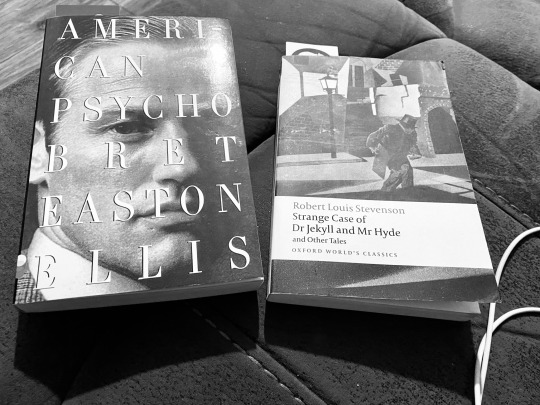
Newly acquired: American Psycho by Bret Easton Ellis
Currently reading: Strange Case of Dr Jekyll and Mr Hyde and Other Tales by Robert Louis Stevenson
#fiction#reading#books#currently reading#mystery#thriller#american psycho#bret easton ellis#transgressive#postmodern#satirical#black comedy#horror#classics#crime#literature#american#dr jekyll and mr hyde#robert louis stevenson#fantastique#fantasy#novella#psychological#science fiction#sensation#gothic#19th century
4 notes
·
View notes
Text
✌A Week in Review by Mark Twain
“Mark Twain in his creative element: A timeless reflection of the author’s legacy, surrounded by symbols of his iconic works.” Support Independent Reviews and Insights at BerndPulch.org! Mark Twain once said, “The secret of getting ahead is getting started.” At BerndPulch.org, we’ve started something extraordinary—offering thought-provoking reviews, in-depth articles, and unique perspectives…

View On WordPress
0 notes
Text
'Blazing Saddles' Movie and 4K Review
The following review was written by Ultimate Rabbit correspondent, Tony Farinella. When it comes to comedy, it’s all a matter of opinion. Comedy, even more than film criticism, is subjective. For example, I’m not an Adam Sandler fan and I find his films terribly unfunny, but there is a reason why his films keep getting released by studios. There is really no right or wrong when it comes to…

View On WordPress
#1970&039;s Movies#1974 Movies#African American#Alan Uger#Alex Karras#Andrew Bergman#Blazing Saddles#Burton Gilliam#Classic Movies#Cleavon Little#Comedy#Crossbow Productions#David Huddleston#Gene Wilder#Harvey Korman#John Hillerman#John Morris#Liam Dunn#Madeline Kahn#Mel Brooks#Michael Hertzberg#Norman Steinberg#Railroad#Richard Pryor#Satire#Slim Pickens#Tony Farinella#Warner Brothers#Warner Brothers Home Entertainment#Western
1 note
·
View note
Text

WHAT IS PIN-UP STUCK?
A humorously raunchy zine inspired by and intended to satirize classic American pin-up calendars, open to all artists in the Homestuck community!
DETAILS:
People of all ages are welcome to apply!
Despite the theme, no sexually explicit content will be allowed, since I am not legally permitted to publish that.
24 artists (maximum) will be selected. Each artist will be responsible for one month, and one character. Two calendar sets will be made in total, one with all trolls and the other with kids + cherubs + bonus characters.
Neither of the calendars will be printed physically. ( I don’t have the resources for that ; u ; )
The zine will be sold on itch.io, either pay-what-you-want or with a set price, and all of the proceeds will be donated to the Palestine Children’s Relief Fund.
The deadline for applications is November 15th.
The overall deadline for the project is December 23rd. While the type of piece involved isn’t especially intensive, if you have a busy couple months ahead, it might not be a good idea to apply.
Good luck, and happy applying! ^u^
405 notes
·
View notes
Text
Soooo…. what ever happened to the puppets from Rudolph the Red-Nosed Reindeer? And why was Santa such a grumpy bastard?
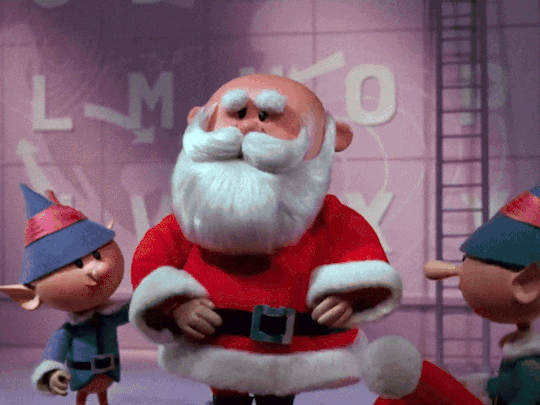
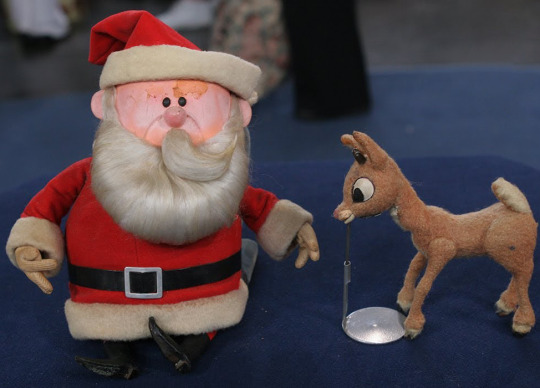
Well, the answer to that first question ended up being a much more complicated story than it first appeared, even complete with a twist ending. And while researching it, I stumbled across the tale of a forgotten Japanese animation pioneer who revolutionized animation industries in Japan AND China, made a whole bunch of propaganda during WWII and the Chinese Civil War, and then created the Rankin/Bass "Animagic" animation style and animated all those classically American classic stop-motion Christmas classics that we know and love. Tadahito "Tad" Mochinaga (持永 只仁).
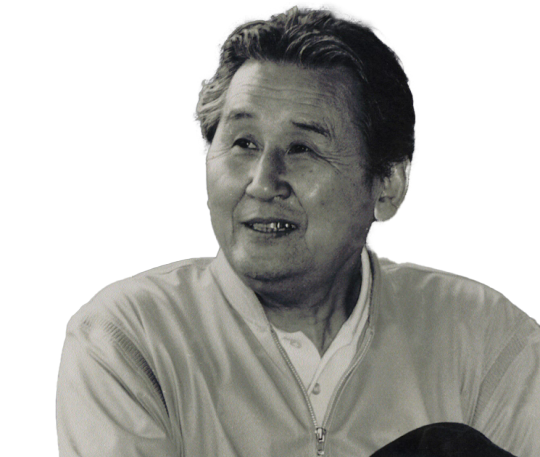
That's right, Rankin/Bass was an anime studio!
Born in 1919, Mochinaga was inspired by early Walt Disney shorts to become an animator. Much like Disney, he built Japan's first ever multi-plane camera rig,


Ari-chan (アリチャン, 1941)
before being contracted to make war propaganda.

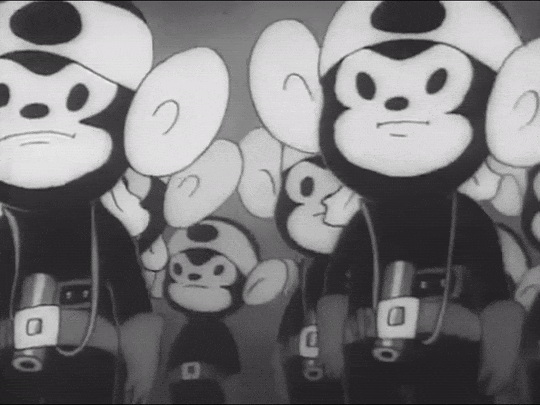
Ironically at the same time he was working under Mitsuyo Seo (瀬尾 光世) on Momotarou's Sea Eagles (1943)—a delightful picture about a bunch of cute little animals triumphantly bombing the shit out of those fat, stupid Americans at Pearl Harbor—his biggest inspiration was working on his own exciting propaganda cartoons from the exact opposite side of the same conflict.

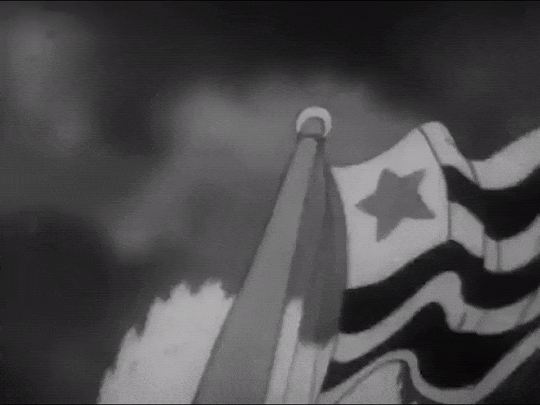
But it was during his time working under the Chinese Communist Party that he inadvertently popularized stop-motion puppet animation in east Asia.

Tasked with making a puppet film that satirized the Nationalist Party's leader, but also dealing with an extreme shortage of film in the country, Mochinaga realized that if he stiffened the joints of the puppets, posed them manually and shot them frame-by-frame instead, he could use only the exact number of frames necessary.
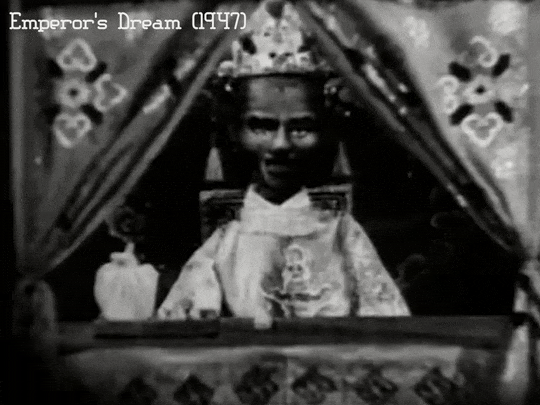
He would continue to refine that stop-motion style after returning to Japan,
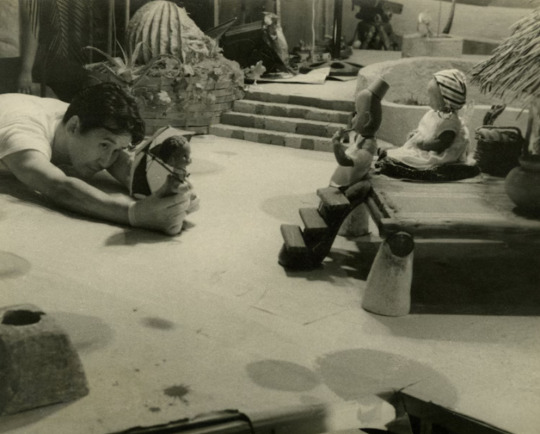
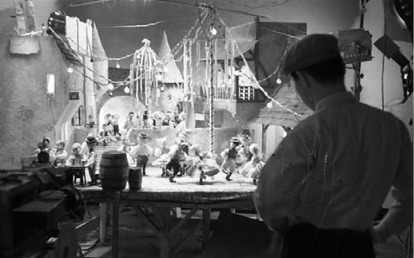
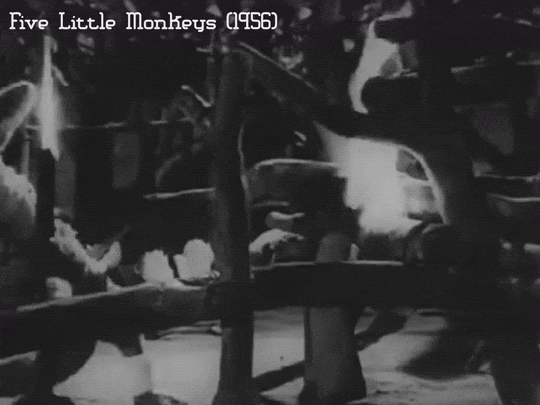
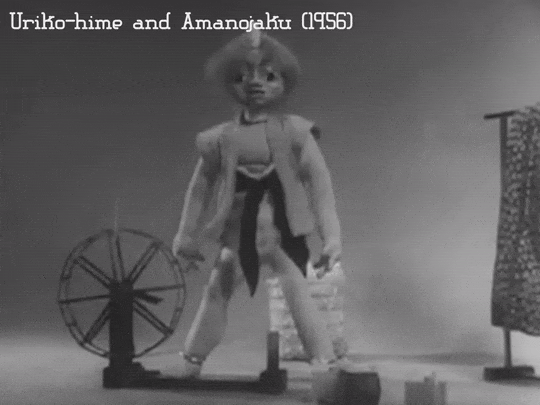
and eventually catch the eye of an American producer, Arthur Rankin Jr, who had just started a studio with his friend Jules Bass.
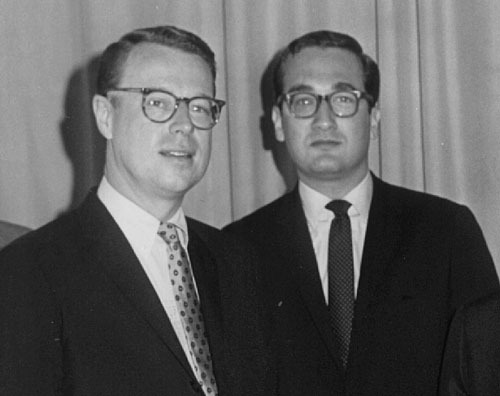
The story continues in much greater detail in this video, which completely obliterated my other plans for the month, and which I promise, does actually answer the question at the start of this post. I really didn't expect this project to balloon into an epic that spans an entire century, but in order to understand the ending, you have to start at the beginning!
youtube
Seriously though, I think this is the best video I've made yet and you KNOW I spent an absurd amount of time learning 3D modeling/rigging/texturing/animation to make what amounts to just some stylistic icing on the cake, but it's a bit different from what I usually make and youtube can punish you for that so if you do find the video interesting and feel like sharing it with someone you think would also be interested, I will personally show up at your house with an old satchel bursting with deliciously ripe oranges and squeeze all that sweet, sloppy nectar by hand, one-by-one directly into your expectant, gaping maw.

#animation#history#video#mini essay#rankin bass#rudolph the red nosed reindeer#gif warning#stop motion#Youtube
321 notes
·
View notes
Text
Stranger Things on Capitalism and Communism:
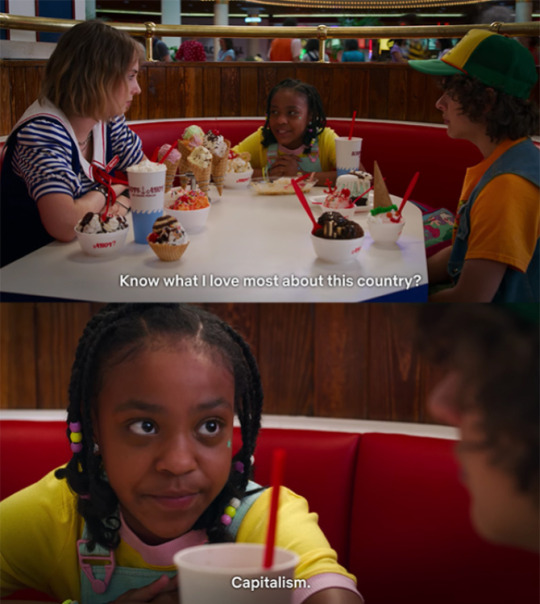
So, i've seen some discussions about Stranger Things message about politics during the years, that started in season 3. To start, i need to make it clear that the series has a really strong anti-communism message, but i don't really think they're really giving a pro-capitalism propaganda, i mean, they're kinda doing it, but as y'all know, American Democrats know how to make it enjoyable for both sides.
How the American Military and Government is depicted:
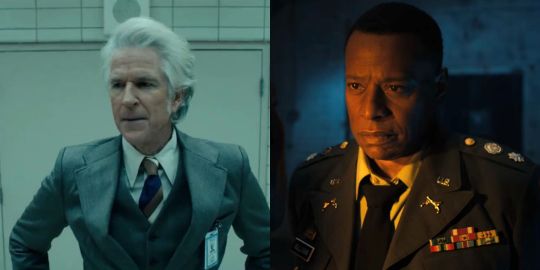
They're pretty much show as "for the greater good" trope, they'll do horrible things with a supposed "good intention", but at the end it shows that they are just power hungry, but those characters have more depth, this make them more "likeable", like Brenner, Sullivan and Owens (YES, HE AIN'T FOOLING ME WITH HIS EMPATHETIC PERSONA).
How the Soviet Union is depicted:

So now it starts to get more complicated; in season 3, all of them are 99% stereotypes, while in season 4, i think they can be described as 50/50. Anyway, most of them are shown as sadistic, power-hungry people who don't care about anything else, so this makes them less likeable, besides Yuri and Dmitri (Enzo).
Season 3 Communism Satire:
I don't think there's much to say here; they're just power-hungry maniacs that at the same time can be smart (building a fucking military base on an American shopping underground, even though they were helped by Larry), and then be extremely stupid and ignorant. At the end, they don't even explain what the ideology behind them is, so they are just generic villains.
Season 3 Capitalism Satire and Alegories:
America without Erica
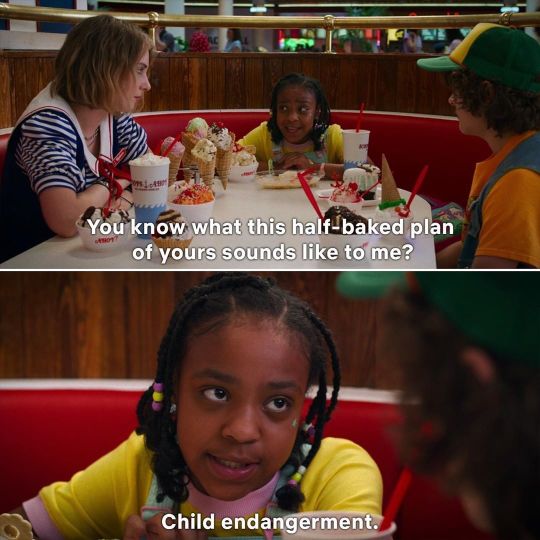
I will start with a scene where many people seem to not see the purposeful irony. Erica, as a black kid, saying that capitalism is great is clearly a joke. She says that on capitalism she will do a job and get paid as she deserves, but she ends up entering on an enemy military base and almost died all because of A ICE CREAM, that at the end she didn't even receive it and didn't either receive the recognition for saving the city either. It can be compared to Black soldiers that fought in wars for the USA and then got discarded.
Rats on The Mall

Now talking about the Starcourt Mall. It's an alegory about consumerism in a capitalist society; the kids would go there thinking it would be more fun because of the things you can pursue, but at the end it was their company that made it really enjoyable. Mike buying something for Eleven was a great way to show it; he could make peace with her by simply talking to her like he did with Will (this has something to do with Mike's character and byler, but this ain't the point of this essay, lol).
The Blonde Pig
There's Larry and the small business closing to discuss too; i see the meaning as the greedy capitalist going against the people and letting the enemy get a hold of their nation.
The Nationalist Lovers
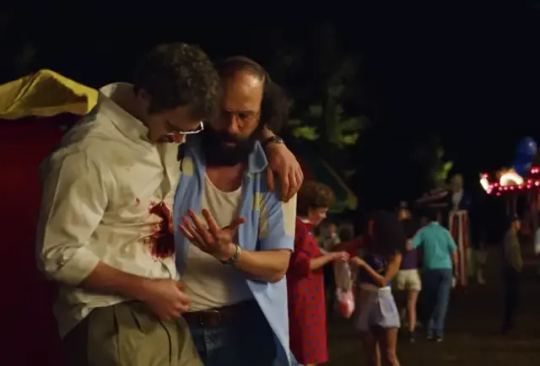
Murray and Alexei are the classic nationalist enemies that understand that they can live together blah blah blah... it's easy to understand. But the scene where Murray explains the July 4th games is kinda confusing, he makes a critic about the way of America using people happy hour to make the rich even more rich, and the poor even more poor, and says that all these are rigged, you can't win them, then Alexei wins one of the games and then Grigori (Soviet super-soldier) kills him. That scene is kinda weird to me, was the meaning that at the end capitalism is the right way and then the "commie pig" had to kill the traitor, or it was to show that at the end you really can't win, because this system will make you go down on a way or another??? It's up to you that is reading to decide.
Brand New Flavor
Lucas and Mike Coke's ad is another scene that is weird; it's obviously a way of the show making propaganda for one of their sponsors, but there's a criticism about the product evolving but at the end being the same shit.
The Consumers
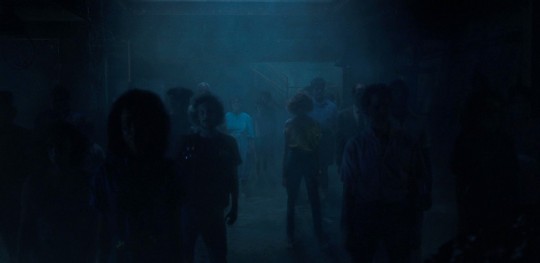
Now this that i will say can be seen as a stretch, but the Mindflayer consuming people could be seeing as this system consuming everybody's souls, until they turn into a literal zombie only following orders. And when they have no use anymore they're just consumed entirely and turn out to be just one of the victims of the system. It shows that even the most reactive and violent people can't outdo this force, as we can see with Billy and Nancy's bosses.
Henry and his (not so) New World:

As we know, Henry was tired of the way the world functioned and wanted to create a new one. There was a bigger force (time) that stopped everybody from fulfilling their potential. What he doesn't understand is that his world will end up being the same; the powerful will control it just as our world, and honestly, this is what Henry want to happen, but what he doesn't understand is that he isn't the most powerful being there, it's the Mindflayer, and he will use Henry until he isn't valuable like the rest. At the end, Henry is just another victim of the same system.
So basically:
"I AM THE CAPITALISM, HENRY!!!"
The Mindflayer said laughing.

Me at the Cinema:
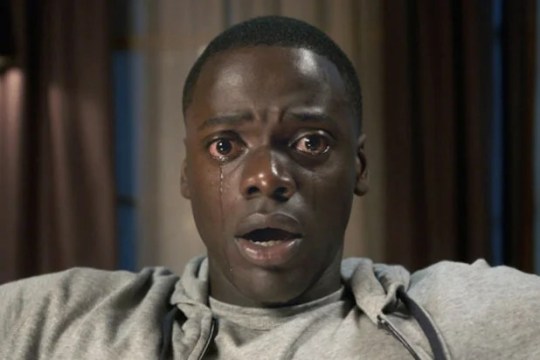
My Conclusion:
They make a rant about both sides, but the anti-communism part is way more explicit and more stereotypical, while the anti-capitalism part is more subtle, and Americans from generation X were the target audience at the beggining of the series, and we know that they aren't the most clever to see behind subtle things or even what is already obvious.
(this is a remake of a post from my old account)
#byler#stranger things#st5#stranger things 5#miwi#will byers#mike wheeler#stranger things 4#stranger things analysis#stranger things theory#vecna/henry/001#vecna stranger things#vecna#henry creel#the mind flayer#mind flayer#erica sinclair#anti consumerism#anti capitalism#capitalism#consumerism#st5 speculation#st5 theory#upside down#stranger things 3#lucas sinclair#el hopper byers#el hopper#eleven hopper#jane hopper
69 notes
·
View notes
Note
1 & 5 for the book ask thing
1 - Fave Books
Gun to my head, I had to narrow it down to five books and felt like drinking bleach throughout. In no particular order, they are as follows:
Providence Girls by Morgan Dante ( @ghostpoetics on tumblr): A historical cosmic horror novel set in 1940s New England which retells two Lovecraftian horror tales in the form of a tragic sapphic love story. Fucking broke me. Exists at the very specific juncture of my mind between the lesbian eroticism and healing from trauma of The Handmaiden, and the body horror and monster romance of The Shape of Water.
Annihilation by Jeff Vandermeer: I'll be honest the movie was whatever for me but this book was what kids these days call a serve...a banger even. Don't know how the author described the surreal morphing sentient, geographic, sort of sci-fi sort of psychological– sort of straight up eldritch horror?? but it terrified the shit out of me, because everything was so beautiful, so unsettling and so distorted, that by the end I wanted to be consumed alive by the fungi and the lighthouse moss too. Also the biologist is to me what Camille Preaker and Abigail Hobbs are to vaguely sad white girls on tumblr.
Walking Practice by Dolki Min: An allegory for queer peoples' alienation in South Korea, wrapped up in a gruesome, dark and funny little story about a crash-landed alien that kills people via dating app stalking. Not only was this book fucking fantastic visually in terms of typesetting and illustrations, but also the translation was genuinely great. And while the narration was very funny, there were also many passages that were gut-punchingly tragic and raw, and captured how it feels to be trans, queer and disabled in a homophobic, conservative society.
Blue Hunger by Viola Di Grado: Gorgeous litfic novella about a young Italian teacher grieving the loss of her brother, who moves to Shanghai and has a toxic, obsessive, dreamlike affair with a Chinese lesbian, one of her new students. This one is not for everybody because the romance is extremely imbalanced, unhealthy and nasty but also I don't care because the writing was so hauntingly beautiful. Think cityscapes, urban loneliness, lesbian sex in dirty alleys and grief striking you at the oddest, sweatiest, most surreal hour of night.
The Sympathizer by Viet Thanh Nguyen: Scathingly powerful political-historical satire novel, about a Viet Cong spy in the South Vietnamese army who escapes to USA during the 1970s fall of Saigon, and once there, finds himself repulsed and fascinated by the heinous facade and global crimes perpetuated by the Western intellectual, political and military complex that he both loathes and lusts after. Easily the best book I read this year, banger from beginning to end, reminded me why I love historical fiction. It TEARS apart American imperialism, the politics of colonial/orientalist academia, propaganda film, and anti-communist fear mongering in the 70s, during the Vietnam war. Delicious and horrifying usage of the unreliable narrator. Extremely relevant, timely read today. If there's one book you take from this list, it should be this one.
5 - Book I would recommend to anyone
We Deserve Monuments by Jas Hammonds. It's a YA novel about a teen Black girl who moves to rural Georgia with her parents to look after her terminally ill, estranged maternal grandmother, but ends up having a whirlwind summer as the dark, violent and tragic secrets of her family's past–and that of her mother's childhood hometown–comes to light. This is possibly one of the best young adult books I ever read, it felt like a cross between a coming-of-age film, and a classic historical transgenerational family saga. It was at once a love letter to finding queer and Black joy and community in a conservative Southern town, but also harrowing grief about historic racism and police brutality and how trauma informs identity, as does love. I mean this in the most respectful way possible: in parts this reminded me of Toni Morrison's Beloved, that's how fucking good it was.
#answered ask#gh0s1y#book recs#book recommendations#books#providence girls#horror#sapphic books#annihilation#southern reach#jeff vandermeer#the sympathizer#viet thanh nguyen#blue hunger#walking practice#dolki min#translated fiction#translated books#trans books#asian literature#novels#yeah.
56 notes
·
View notes
Text
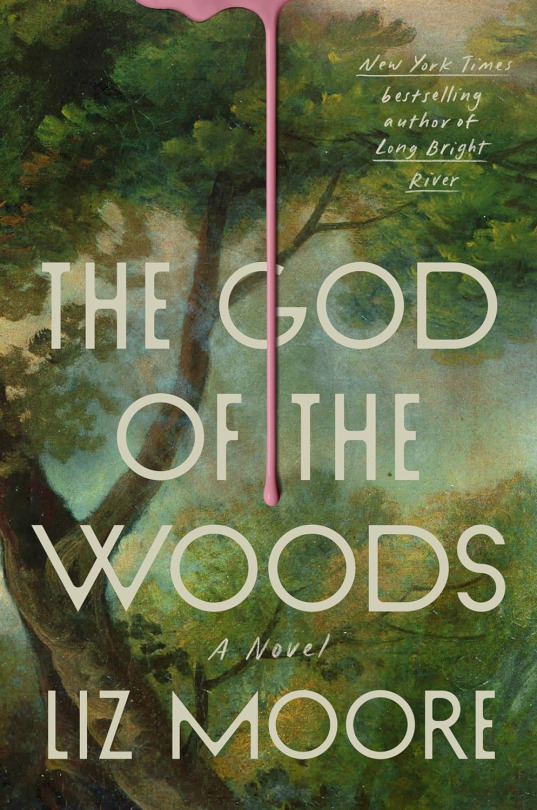
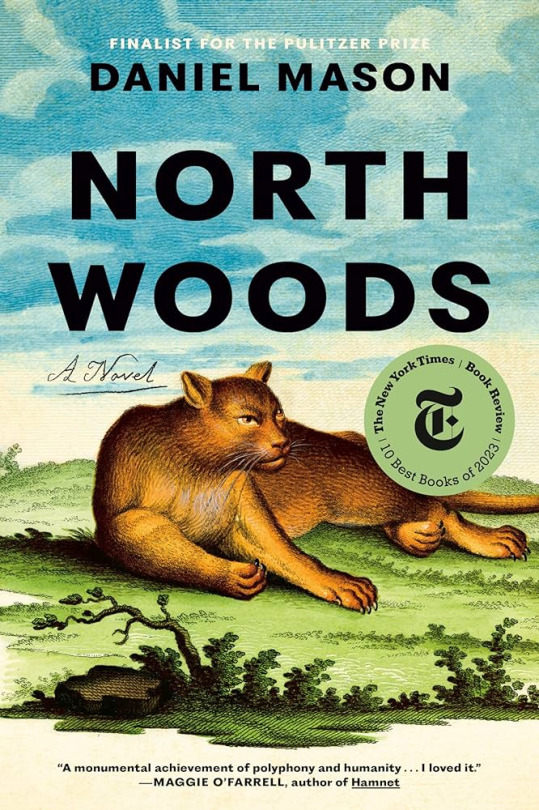




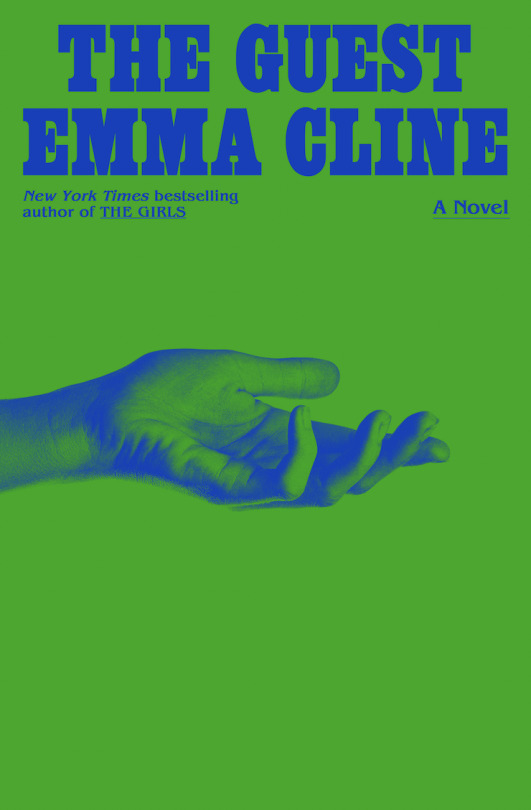

@alluroa asked me about book recs, so I'd thought I'd do a combined
2023-24 fav books in review
I've grouped them together in pairs for thematic relevance
The God of the Woods // North Woods
God of the Woods is set in a girl's summer camp in the 1970s; North Woods is a long American historical novel that traces the history of one patch of New England land from the first European settlers onwards. I them together because they cover similar geographical regions. I thought both of them had an incredible sense of time and place, very good if you enjoy new england
2. Breakfast of Champions // Penance
To me, both are just fucking MASTERPIECES that defy genre. Sorry guys that I'm trying to toot Vonnegut's horn in 2024, like wow, check out this tiny indie writer that no one has ever heard of. But Breakfast of Champions truly feels shockingly fresh for something written fifty years ago. Race inequality, gender relations, the rot of late capitalist America... 1973 Vonnegut had already seen and nailed it all.
Penance by the way is a must read for every tumblrina. It has the most perfect pastiche of fandom I had ever seen, it's got me HOWLING multiple times. And the way that Clark depicts female friendships...it's like those photorealistic dutch paintings of flowers where you can't believe it was painted. I can't believe anyone just. Made this up. Her fucking mind.....
3. The Invisible Kingdom // Strangers to Ourselves
The Invisible Kingdom is about the writer's struggle with chronic illness, which I think precedes long covid but very relevant to the Current Conditions Of Our Times. Stranger to Ourselves's chapter on eating disorders and the chapter on schizophrenia reframed how I thought about those things. Maybe I'm shallow but I genuinely found it so profound in the way it framed mental illness as a "career" that people fall in to. That's a very bad summary. Go read it yourself.
4. The Guest // The Master Key
Okay, sorry, but I felt like the entire world was reading The Guest last summer so I won't explain too much, but I'll say I really like this style of prose. The language is simple, but so elegantly done. Very sharp social satire. I wish I could write like this. The Master Key is a Japanese mystery novel that's a pastiche of the Golden Age of 20th century mysteries. Very classic "locked room" mystery, but with a really brilliant dose of social drama. It's set in an apartment building where only unmarried woman are allowed to live. The tenants who remained after decades are often sad, lonely, and hiding some bizarre secret. So good I almost forgot it's a murder mystery
77 notes
·
View notes
Text
fanfiction writing culture was like. pretty different when My Immortal was new. the 'no concrit' culture we have now evolved out of a scene in which openly mocking 'badfic' was heavily normalised.
like. i started posting fanfiction when i was about 14 & once had someone come into my reviews to pick apart everything they felt was wrong w a story i'd posted. i'd been online long enough to know not to engage w that kind of behaviour and also when i was 14 i was convinced i was some kind of Literary Genius so i just deleted it and moved on.
but every so often i remember this fucking review. the tone was so sneering & condescending and what really gets me is that it was pretty obvious that they'd pegged me as a teenager (they mentioned that i'd made the character i was writing about 'talk like a 21st century american teenager') so it's like. you saw someone you thought was a teenager writing something harmlessly stupid and went out of your way to tear it apart? who does that??
anyway the author of My Immortal was, supposedly, a teenager girl and to be blunt the initial response to it was Kinda Mean. like at this point it's a fandom classic (and also i 100% believe it was satire) but like the culture around it began in a climate where a lot of people did fervently believe in this Boogeyman of idk like. teenage girls who were ruining everything with their badfic and Mary Sues.
all this to say no im not surprised that a lot of people Fell For It. i'd say the people who thought it was real were prolly as much its target as the kind of fic it was spoofing lmao.
343 notes
·
View notes
Text
How Taylor has silently fought the “Aryan Princess” rhetoric alt right nut jobs have been pushing onto her for almost a decade
Although it apparently started as satire (could not find that root myself), in 2016 alt right conservatives attempted to make Taylor Swift their “Aryan Goddess”. They praised her “Nordic blood” and her white significant others.


These alt right conservatives genuinely believed that Taylor had a secret love for Trump. Remember, this is pre- Miss Americana. At this time she was “apolitical” publicly. They even made memes pointing to her having yt supremacist ideations


These beliefs were fueled by her wildest dreams music video, which was HIGHLY criticized (and rightfully so)

Inspired by classic Hollywood relationships like Richard Burton and Elizabeth Taylor (also referenced directly in her music) and movies like Out of Africa, the music video seemingly takes place in Africa. However, only depicts a white cast and crew.

While this wasn’t seen as an overt act of racism by Taylor, it was held up as an example of white America. For many, it showed that Taylor Swift was a white person, who was largely surrounded by white people. And while it isn’t purely a swift problem, it is an American problem


Although these factors, white male leads and apolitical public existence, do not prove an ideology held by Taylor, the right ran fast and hard with it.

So how did Taylor respond to this? While we all know that Taylor did not publicly comment on politics until 2019,

the Wildest Dreams music was the last video Taylor had a white male love interest (not including celebrity features). They have either had no love interest, or a man of color ever since.




Not only in music videos, but on stage as well.

Taylor Swift is still a white woman, who is often touted as the face of white feminism. We still know she makes mistakes, even in this era. And it is not my place to say she is doing things properly. But I find it interesting to see her response to this topic consistent since
source
Original Twitter Thread
29 notes
·
View notes
Text
Interview with The Guardian (2025)
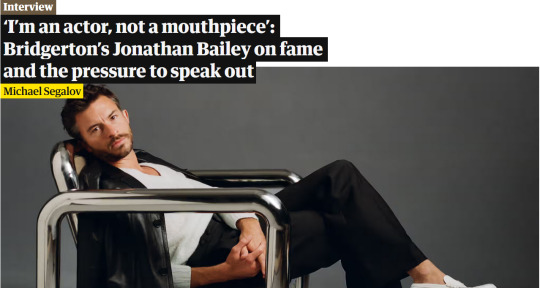
The actor Jonathan Bailey sits at a large table in an otherwise empty room: charcoal cable knit sweater, loose pinstripe trousers, hair neatly coiffed. He is chewing gum, sipping coffee, talking through his recent career, and a certain serendipity that has rendered him reflective. At 36, he’s fresh from his turn as likely-lad love interest Fiyero in Hollywood’s blockbuster adaptation of Wicked; as a child, seeing the stage show was a milestone for him. “I remember thinking Fiyero was such a good part.” Later this year he will star in Jurassic World Rebirth alongside Mahershala Ali and Scarlett Johansson. “I saw the original Jurassic Park with my family, aged six, at the cinema,” he says. “It was the first time we all went together to something like that. It was seminal, but so rare for us.”
And this month, Bailey will star in Richard II at the Bridge Theatre, directed by Nicholas Hytner. Bailey is its protagonist. It is another example of full-circle career moment. In 2013, he appeared on stage in Hytner’s Othello. Same playwright, same director, same city – Bailey can’t help but consider all that’s changed in the intervening years. “Back then I was too young,” he says. “I came into the rehearsal process not mature or confident enough.”
Landing the role of Cassio, one of Othello’s lieutenants, had been so important to him then. “I didn’t go to drama school,” he says, “and there was a common belief that if you hadn’t, you wouldn’t be able to do classical texts, or perform in the big theatres. There are all these stories we are born into that we have to unpick. For me, one of those was how limited I felt.”
Bailey remembers the day that changed. “It was late December,” he says, “and I was walking along London’s South Bank.” He was on his way to the National Theatre to meet Hytner for a callback. “I’d worked so hard and for so many reasons it felt…” He cuts himself off, then goes on, “Working at the National was beyond my wildest dreams.”
Bailey performed the two scenes he’d prepared. Then, Hytner unexpectedly suggested a third, which Bailey hadn’t rehearsed. “I’m not very good at just reading and going,” he says. “I can’t really come up with… Anyway, I went with instincts. He offered me the job in the room. It was a defining moment in my career.”
All sorts of opportunities followed for Bailey: American Psycho at the Almeida; Phoebe Waller-Bridge’s TV debut Crashing; King Lear opposite Ian McKellen; BBC satirical sitcom W1A. He was made very famous for playing a leading Lothario in Bridgerton, the Netflix behemoth. “Now being back with Nick,” he says. “I have a much fuller and more cherished understanding of him as a human as well as a director. Getting back into a room with him now, with all that’s happening, just felt obvious.” Hytner’s praise for Bailey is just as high: “He can speak Shakespeare like it’s his first language… The stage is his element.”
It’s Wednesday lunchtime, early January, in a central London studio space. We’re meeting halfway through five weeks of Richard II rehearsals in full swing a few floors below us. He’s sitting at a large table. In front of him is a bulky script covered in yellow highlights. “It’s only half,” he says, flicking through, playful panic in his voice. “Not only that, I’ve thinned it, and taken out the scenes I’m not in, which feels very Richard II.”
It’s Bailey’s first stage production since 2022. Through Bridgerton, he has been exposed to a global audience. But theatre is where it all began. “So returning to the stage, now, just felt so right. And I don’t think I’ve changed at all, even if certain things around me have.” It has taken some adjustment, this new level of “Black Mirror-esque” notoriety that he’s experiencing. It’s why he likes the intimacy of these rehearsals, after months spent on sprawling film sets. And he’s enjoying being based in London for an extended period, close to friends and family.
Bailey is charming, handsome and self-effacing as we talk, but doesn’t seem entirely at ease. That gum chewing is fervent now; he’s fiddling with what’s in front of him. He habitually self-edits as he speaks. There’s a vagueness that, at times, feels purposeful. At regular intervals, he simply stops mid-sentence.
Take the play itself. “It’s such an incredible, searing interrogation of power, government and monarchy…” he says. “You have someone with the cast-iron right to rule, who is absolutely unfit to lead, emotionally underdeveloped… And Shakespeare wrote to be played, not published. There are so many references and nuances to what an Elizabethan audience would have understood… It’s about translating it from that, and delivering it to a modern audience, so the effect hopefully has the same vivid fervency and front-footedness especially politically and especially in this instance with monarchy and leadership.”
It sounds interesting. So where is he turning to for inspiration for his tyrannical overlord? I ask. Trump? King Charles? The Saudis?
“That’s for the viewer to see. I have very clear ideas and I hope the audience will, too…”
He won’t be drawn. I’m curious as to why. He shakes his head.
“You’ll have to come and see it.”
Later, over email, Hytner is more forthright: “The play wonders what happens when an entirely legitimate leader is set on ruining the country he leads. No good options. Submit or resist – either way you end up with chaos.”
Ahead of Wicked’s late-November release, there was a preview screening in Sydney. “It was part of this massive press tour, but for me it only lasted two weeks. The girls are incredible,” Bailey says of his co-stars Ariana Grande and Cynthia Erivo, plugging the project for months on end. “And they’re still at it, still shining.”
In Oz, Bailey went along with one of his sisters and her two daughters in tow. It was the first time he’d sat back and watched the film properly. “I was so overwhelmed,” he says. “Even now, it makes me quite emotional. If there was the purest form of joy I had as a kid, it was singing and dancing.”
His family was based between Reading and Oxford. Bailey has three older sisters. As a child, he’d be dropped at basketball club at the local village hall. “From outside, I could see my sister’s ballet lessons through the window. I wanted to be in there with them. I’d go and wait at the back of their class in my Velcro trainers.” He enrolled. “I was obsessed and loved it. Dancing and singing felt like a vocation.”
Music also filled the family home. By the time Bailey was 10, his sisters would go out clubbing. “The next morning, they’d come back, and I’d get them, hungover, to do impressions of their different friends dancing.” It was a family affair. “We loved 90s club classics. Me, Mum, Dad and my sisters went through a phase of going into the new room – we had an extension, then called it that for 20 years – and we’d put on vinyls and dance, all of us.”
One day, he stopped. “I don’t know what happened,” he says, “for whatever reason, I didn’t confidently carry through the dancing. I got self-conscious in my teens that it was signalling something else. It just didn’t feel… I probably just knew it was better to be playing rugby than dancing. I became really self-conscious. There weren’t other dudes dancing.” One teacher called Bailey a “fairy” in front of his entire class. “In your teenage years it’s so raw. You lose your skin. And there are certain things in life,” he says, “that allow people to think they know something about you, and those assumptions mean you stop doing something you love. You curb or you police yourself. You don’t make the joke, or say the quip. You don’t stand up and advocate for yourself or your friends. And you start to slowly crumple. That’s purely on the basis of this idea of signalling. These stereotypes.”
One becomes fearful, he continues, of the immense hurt that others can cause. “Even more pain than binding yourself up slowly and creating a space of safety and refuge in your own mind or heart. That’s where it gets dangerous and people stop doing the things they’re supposed to. And how brilliant that we…” He pauses, surprised, concerned even – it seems – by how much he’s sharing. “It’s a scary time, isn’t it. On the one hand, I do think there’s such a… People are so much more open-minded about what defines masculinity now. What defines heterosexuality. What defines gender. But on the other hand, there’s a swing, obviously, towards… Anyway, that one will have to be a dot-dot-dot for you.”
It’s not that Bailey dropped performing as a child, only that things took off in a different direction. Back in ballet class, there’d been a callout from the Royal Shakespeare Company. “They needed young boys to play Tiny Tim in A Christmas Carol.” He was seven years old. “My parents weren’t sure. It was so outside their world.” His mum worked in the NHS. “And Dad was a DJ, basically, in Piccadilly Circus at [70s nightclub] Snoopys.” But a child actor? “It’s a big ask, from a kid. I was really protected by them, but they gave me this opportunity.” He was cast, and continued to be through school. “It was extraordinary, really. I didn’t miss any lessons. By 13, I’d done three productions for the RSC, and a stint in the West End. All before I hit puberty.” Then came his first Shakespeare production: Prince Arthur in King John at the Barbican with the RSC. “I was 12 or 13, and that set me on another course. ‘Fuck, OK, you can also do this.’” The memories are visceral, even now: “The sickly, sweet smell of fake blood. Dry ice. All those senses. I was taken. That’s maybe where my creative juices were channelled more, over singing and dancing.”
He has worked solidly since his teenage years. Bridgerton, though, catapulted him to stardom. Afterwards, says Bailey, “I was contending with how things would change in my life.” The press introduction, a growing, global fandom, interest in his personal life and sexuality… “On one hand,” he says, “the success of Bridgerton, being able to play that role, and for who I am not to affect people’s perceptions; the love story between a man and a woman.” He pauses, again. Oh, actually.” Some nervous laughter. “It’s just, I’m cautious. I’m who I am and always will be. It’s an extraordinary thing to see and hear the word ‘gay’ next to your name all the time. It’s something I’m incredibly proud of, but it’s also not something anyone else would be defined by. So to go straight from Bridgerton, where inevitably that was talked about, to do a series like Fellow Travellers? It came along like some sort of beacon.”
Fellow Travellers, a Showtime series in which Bailey and Matt Bomer star, follows the romance between two American politicos, from the 1950s to 1980s. Production started as series one of Bridgerton started streaming. Among a predominantly queer central cast, cocooned on set, Bailey’s sexuality was entirely un-noteworthy. “All with our own experiences,” he says, “coming together. And learning about the history… The men who endured and experienced such horrendous and extraordinary things.”
Simultaneously, he was inundated with requests from charities following Bridgerton’s success. “I felt frozen by wanting to help.” The sheer scale of what was being asked and what he might do with his platform, connections and cash felt overwhelming. So, he founded the Shameless Fund. “Raising cash and erasing shame to support the global LGBTQ+ community. We’re giving grants this year. I’m so proud of it. It was all in theory. It seems so obvious and clear. We’ve raised a lot of money for initiatives that need cash and a platform. “And the thing is,” he says, “I can’t be a mouthpiece. I’m an actor.” As is clear through our conversation so far, he’s impassioned and engaged, but being outspoken doesn’t always feel comfortable. It must be challenging, I say. So many eyes and ears pointed in his direction. “The noise is turned up,” he says. “And when it’s about your family, or your identity… And nobody is going to question that headline, in a different outlet with their own agenda. That’s what’s left and it isn’t true. That’s why I’m really protective. I’ve seen something so specific about my identity be twisted. Ultimately you want peace within yourself, because the world is wild enough as it is. It’s too important now, with rights being stripped away. What’s so obviously looming…” Back to Wicked, I suggest.
“OK,” he says, relieved, “so I was doing Cock [his West End stint in Mike Bartlett’s comedy about sexual identity] and I knew a film of Wicked was happening.” In the dressing room before curtain up one night, Bailey recorded a self-tape. “As I was singing, doing a karaoke version of [Fiyero’s big number] Dancing Through Life, I got called to stage on the Tannoy. Fuck it, I just sent it.” There were some positive noises. “Then the dates didn’t look to be working out. Wicked said they couldn’t be sure about what they wanted…” Bailey made other plans. Then, out the blue, dates shifted: the part was his. The months that followed were hectic: during one stretch, while juggling Fellow Travellers, Bridgerton and Wicked, he was filming for 34 days straight.
“I’d come from set, sleep on a flight, go straight to a Bridgerton ball, then the next day be dancing with Ari and Cynthia. Everyone else for Wicked had three months of rehearsal. I had three days.” There’s a knock at the door: Bailey is being summoned back down to rehearsals. “The conclusion to that,” he says, “is Wicked happened and I’m so proud. Before I knew it I was Dancing Through Life…” Suffice to say, he’s thrilled to be.
Richard II is at the Bridge Theatre until 10 May, bridgetheatre.co.uk
Source
52 notes
·
View notes
Text
Happy North American publication day to HIGH VAULTAGE, by @victoriocity! And many thanks to @terribleminds for the boost. (not least to my ego since I get a shout-out)
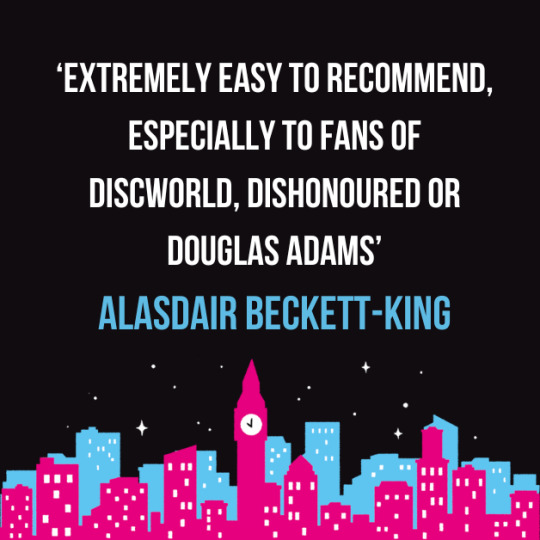


It's available through all good bookstores, AND you can get signed copies here!
OTHER NICE THINGS PEOPLE HAVE SAID:
'Hilarious' - Matt Young, co-creator of Hello from the Magic Tavern
'A joyous, delightful romp...filled to the brim with clever jokes - perfect for anyone looking for a Pratchett fix' - Caitlin Schneiderhan, screenwriter, Stranger Things
'More please' - SFX
‘High Vaultage is exactly what I've come to expect from the Sugdens - inventive, imaginative, and hilarious’ – Lauren Shippen, creator of The Bright Sessions
‘There are some very big concepts in this novel, ambitious settings, and amazing new discoveries. The satire is even more smart, the wit even more sharp’ – @skyfullofpods
'Absolutely overflowing with imagination and creativity . . . I also loved how witty and clever the writing and dialogue was and I found myself genuinely laughing' - @foreverlostinliterature
'High Vaultage is endlessly entertaining - a classic mystery adventure with 10,000 volts of mad science put right through it. It's not just the type of story I wish I could read every day, it's the type of story I wish I could write. Reading it would make me furious with envy if it didn't keep me so busy grinning from ear to ear' - Gabriel Urbina, creator of Wolf 359
#High Vaultage#Chris and Jen Sugden#Victoriocity#Chuck Wendig#Adam Roberts#Alasdair Beckett-King#Helen Marshall#Matt Young#Hello from the Magic Tavern#Caitlin Schneiderhan#Stranger Things#Lauren Shippen#the Bright Sessions#Book reviews#Comedy SF#Podcasts#Gabriel Urbina#Wolf 359
46 notes
·
View notes
Text
I’ve been thinking a lot about earlier versus later seasons of M*A*S*H and I wanted to see if I could figure out how to keep Frank through the tone shift without sacrificing the quality of the story or the character. Just a fun hypothetical :] Click “read more” for this because it’s going to be a long one.
First I want to look at Charles. Between Frank and Charles, I don’t think there’s a better or worse character. Frank is a better tool to further the anti-military, anti-war message, but Charles is a more dimensional character, and it would be impossible for them to switch places without changing the characters. I mean, imagine Frank in GFA…ridiculous, but I am going to put him there. Bear with me.
I prefer the earlier seasons for their satire, but I appreciate the later ones for the realism in characters like Charles and Margaret, so it would be nice to keep those strong core values while also delving into more dramatic territory. Let’s look at what makes Frank work. Mostly, it’s the fact that he’s a military fanatic. His adherence to the rules gives Hawkeye and Trapper (also BJ, for a bit) something immediate to push back against. Frank is a satirization of the unyielding conservative mindset and also a stand-in for the military itself. Obviously Hawkeye can’t punch the US Army but he can punch Frank. But being such a useful tool means that when Frank shows a little humanity, the writers have to pass over it pretty quickly.
What makes Charles work? Simply put, he’s human. He’s a terrible snob, he’s racist, he’s classist, but he’s fun. He DOES actually care for people, he likes playing pranks, and he likes Hawkeye and BJ. But he doesn’t have strong feelings about the military, and that means that when Hawkeye and BJ argue with him, it only serves to illustrate their personal relationship. Charles doesn’t stand in for anything larger besides economic class, which isn’t really an integral topic of M*A*S*H since it’s something that matters a lot more back home than at war.
I think the only possible way to keep Frank would be to give him a little of Charles and a little of Margaret—that is, redeem him, just a bit. Whereas Charles was never really painted as an antagonist and Margaret’s character development came slowly (and was also more personal than ideological), I want to give Frank a very sudden and violent awakening. Let him lose Margaret and let him have that mental breakdown, but treat it with a little more dignity. Institutionalize him for a bit and then send him back to the 4077th where he’s still the butt of the jokes, and now Margaret, his only support system, is pulled out from under him. Let him realize that after doing everything right and licking every boot he was supposed to, he still failed. He didn’t get the girl, and worse, he ended up in the looney bin. That’s not supposed to happen to Good American Men. At this point, I’d hope that his need for companionship would override his worship of the military. Every mention of Frank's past shows that he has always been lonely, and I would use this opportunity to really bring that out.
I’d like Frank to make an honest effort to befriend Hawkeye and BJ and put his actions where his mouth is, maybe by ignoring one out of every ten broken rules. Keep him racist, keep him republican, keep the baffling fact that he doesn’t seem to realize they’ve left America, but make him enough of “one of the guys” that when these things come out it’s disappointing rather than just classic Frank. His role would have to change from a caricature of the rigid conservative mind to an example of how the ideology you’re trying to fight is often present even in your own friends. It might even help to highlight his hypocrisy! Turn a blind eye to Hawkeye’s antics because they’re friends, but write up someone else for the same thing simply because he doesn’t know them.
Would I want Frank to turn completely against the military? No, it wouldn’t serve his character. But I’d like to see him nudged just a little bit and forced to actually confront his own beliefs through Hawkeye's conscious and consistent effort. It would be nice to get him to the point of thinking before blindly assuming that whatever the army wants is what’s right. Granted, the guy is brainwashed and 9 times out of 10 he would definitely side with the army, but that 1 time would be fun. I think it would be a decent way of showing some tangible results of Hawkeye’s resistance. His actions were never going to stop the war or destroy the military or overthrow the government, but what if he could chip away at the armor starting with one person? I would have liked the show to say more clearly that Hawkeye’s actions were worth something, and that’s just one way it could have been done. I know Margaret is also an example but as I said before her growth is largely personal, so I think Frank would be a clearer target here.
So we’ve reached the end, we’re at “Goodbye, Farewell, and Amen.” What are we going to do with Frank? I think there’s only one option. Have him quit medicine. He doesn’t have a genuine passion for it and he isn’t a good doctor, so I think this is the most obvious first step in the right direction that he can make. We won’t get to see where he goes from here, but hopefully it’s somewhere much better.
I’m not saying this scenario would be any better than just sending him home and being done with it, but It’s fun to think about a world in which we get more Frank. I’m biased by the fact that I just thoroughly enjoy him. Maybe this is a universe where the original script for “George” airs!
#opened my laptop to work and wrote an essay instead#frank is a great thematic tool to further the narrative#and yet I can't help wanting to save him from the jaws of the story#charles is a great character with a lot of depth#but i want him to have more symbolic value#you win some you lose some#this whole thing is my idea of how to save frank as a character#it doesn't involve saving him as a person#just making him marginally better#rest assured i DO have ideas about how to save him as a person too#unprecedented levels of frankposting over here#mash#m*a*s*h#frank burns#charles winchester#charles emerson winchester iii#hawkeye pierce#mine
22 notes
·
View notes